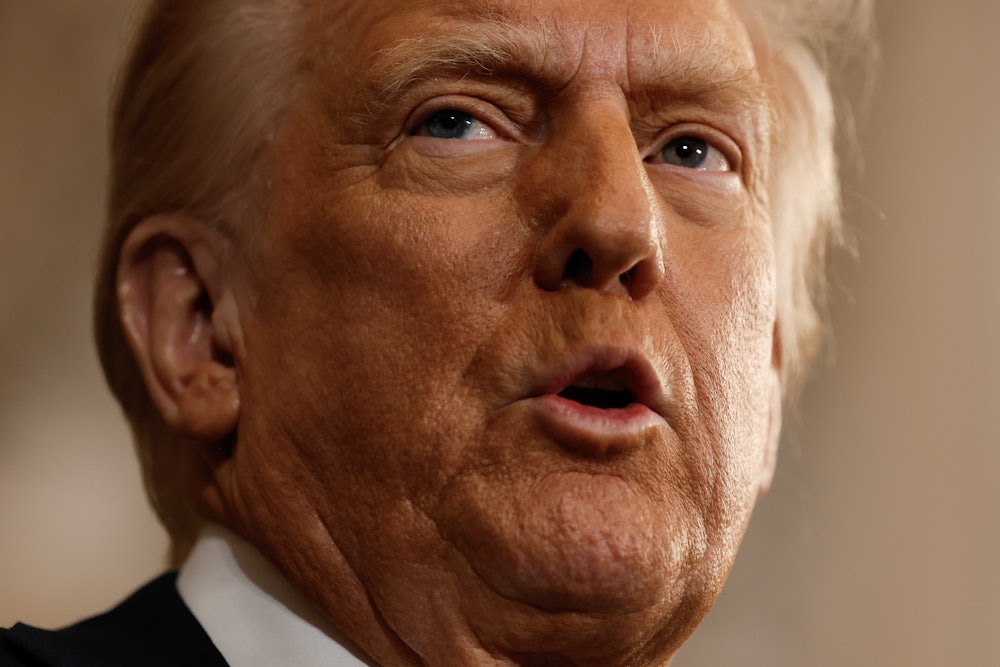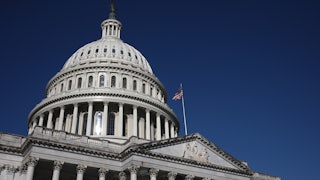It’s not just a cruel irony that, as many have observed, Martin Luther King Jr. would have opposed Donald Trump and likely been out protesting somewhere today had he been alive. That’s obvious. The cruelty of the joke that Trump swore the oath of office on MLK Day runs much deeper than that, because each man is the epitome of our two American traditions that have been in conflict since the 1860s and will probably be furiously at war in new and worrisome ways, maybe even approaching some kind of Armageddon, over these next four years.
The traditions date to the period right after the Civil War. It has been referred to, notably by the great historian Eric Foner, as America’s “Second Founding,” when the Thirteenth, Fourteenth, and Fifteenth Amendments finally established the American ideal of equality of law for all—completing, in other words, the revolution that the Founders left unfinished. This has been the standard interpretation of the importance of that era.
But as we know all too well these days, there are no longer any “standard interpretations”—a phrase that makes any right-winger reach for his revolver, to invoke another famous right-wing complaint about mainstream small-r republican values. Down South, that never was the interpretation of the Second Founding. In the South, it meant destruction and occupation and, most of all, the transfer of political power from the wealthy class that had held it for 200-plus years to people who had been their property.
That was the Southern interpretation of what we call Reconstruction. And so the South countered with its own narrative, Redemption: the return of white supremacy and the re-subjugation of the Negro, enforced through newly written state constitutions and through the violence carried out by groups like the Ku Klux Klan.
We’ve been locked in the battle between Reconstruction and Redemption ever since. No single American has embodied the Reconstruction narrative more fully than King, who, a century after those amendments, finally and courageously brought the country face to face with the ways in which even those bold amendments remained unfulfilled, thus helping to bring about full legal equality—and paying with his life for doing so. And surely no one has represented the Redemption side of the argument more than Trump. To say that is not to attempt to associate him with cross-burnings. But Trump represents, and pledged in his inaugural address to enforce, the American tradition that is handed down to us from the Redemption movement.
Trump on Monday said some nice things about unity. He expressed gratitude to African Americans and Latinos for their support at the polls and vowed he would remember: “To the Black and Hispanic communities, I want to thank you for the tremendous outpouring of love and trust that you have shown me with your vote.” That was actually kind of a gracious sentence (except that of course he had to fart on it in the next sentence by boasting that “we set records,” which is questionable). If he governs like that, even 20 percent of the time, maybe things won’t be as relentlessly bleak as we fear.
But come on. He’s spent the last two years telling us what he really thinks and will do. And there was plenty of that in the speech as well. We’ll learn soon exactly what it means that he’ll “declare a national emergency” at the border and that he’ll send troops there “to repel the disastrous invasion of our country.”
That’s the first enemy of the modern-day Redemptionist: the other. The second is those who challenge traditional social and sexual mores. And so he promised to end “the government policy of trying to socially engineer race and gender into every aspect of public and private life” and promised, to a sustained standing ovation, that “it will henceforth be the official policy of the United States government that there are only two genders, male and female.”
The Redemptionist’s third target deals in symbols, and the eradication of those that suggest national weakness, irresolution, dissipation of the national fiber. So, sure enough, the Gulf of Mexico is to become the Gulf of America, and the Panama Canal will be reseized. And of course the awesome Alaskan mountain whose Native American name, Denali (“the great one”), was bestowed by those pre-DEI meddlers in the 1970s, will once again take its rightful name after William McKinley, a president who had no connection to Alaska. (The name Mount McKinley was first used in an 1897 news article by a gold prospector who was an admirer of the new president. It took McKinley’s assassination for the idea to take root.)
The weak but blamable other, the challenger of sexual mores, those who have stripped the nation of its symbolic honor: These are always the Redemptionist’s targets. None of this is to say that we don’t have problems at the border (we obviously do) or that the forces pushing for social change can’t sometimes get out ahead of their skis (they can). These are the debates liberals and conservatives have in a democratic society.
But Trump doesn’t want to debate any of this. He wants to impose his version of it. And he just might. After all, he has some big guns on his side.
First—God. I was wondering if he’d invoke the (first, dramatic) assassination attempt. And he did it in exactly the fashion one expected—to play on the religious emotions of his admirers and position himself as chosen: “But I felt then and believe even more so now, that my life was saved for a reason. I was saved by God to make America great again.”
But second, and perhaps more importantly, he now seems to own the billionaires who control the country’s—and some of the world’s—most important media platforms. Even the TikTok guy was there. If God deserts him, these men will always have his back.
And that’s what’s new here. The reactionary movements that have peppered and darkened this country’s history—segregationists, Joe McCarthy, others of that ilk—have usually been opposed by establishment forces. Sometimes that opposition was slow to find its voice, but it never outright supported the Redemptionist strain. Today, Trump has the establishment’s backing. As they went through the motions of tradition and decorum on Inauguration Day, we saw their smile. We’ll see their scowl soon enough.






